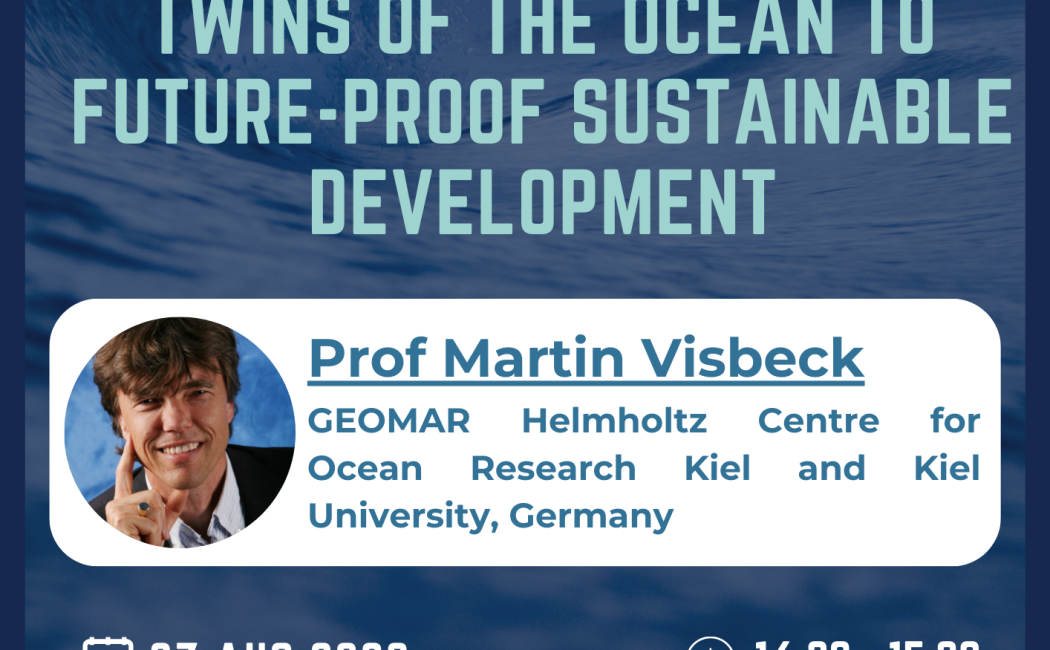


The Marine Microbiomes Lab invites you to attend the Seminar presented by Prof Martin Visbeck, GEOMAR Helmholtz Centre for Ocean Research Kiel and Kiel University, Germany, titled :
Opportunities of Digital Twins of the Ocean to future-proof sustainable development
Abstract: The ocean remains largely under discovered and systematically observed. However, over the recent decade more advanced robot-based observations and a significant improvement in ocean models allows to build digital replicas of the ocean with increasing realism. At the same time human use and interference with the ocean is increasing in particular in coastal regimes. One of the key challenges is how to best govern human interactions with the ocean. Such decisions should be science supported and Digital Twins of the Ocean provide an interesting framework.
Digital Twins are digital replicas of real-world objects that have a two-way connection between the digital twin and the real ocean. Ocean observations provide an update on the state of the ocean and changes in human behavior are expected to alter the ocean. Digital Twins of the Ocean (DTO) rely on an adequate ocean observing system where satellites and robots provide increasing capabilities. They require a prediction system that will be based on dynamical ocean circulation models enhanced with component representations of the chemistry, biology, and ecology. In particular the latter elements benefit from machine learning approaches. Finally, the DTOs allow users to get answers to ‘what it’ questions and should have the capability to visualize future ocean states depending on human actions.
Thus, an accurate real-time ocean observing system supplemented by a state of the art data sharing system is central to the success of a DTO. Whilst the network of marine observing systems has made great advances in recent years, there are still oceanic regions that remain under-observed, and large observational gaps for many essential ocean variables (EOVs) exist. Marine robotics provide an opportunity to fill this gap, as they can collect data from regions inhospitable to humans, e.g., the Abyssal Ocean and supplement the more expensive human operated ships.
In addition to natural ocean phenomena, DTOs can include socio-economic factors (e.g. cost of action, ocean-use, pollution). By illustrating different possible mitigation or adaptation scenarios, for example the construction of a dike to mitigate sea level rise, the DTO allows its users to answer concrete ‘what if’ questions that inform development decisions. DTs thus enable the anticipation of desired outcomes or undesirable consequences of human-environment interactions, greatly facilitating policy and decision-making processes. The challenge is to ensure that DTOs are interoperable and become easily accessibility. Then DTOs can be used by a variety of stakeholders: by scientists to understand the ocean, by policymakers to make well-informed decisions, and by citizens to improve ocean literacy. As such, DTOs present a valuable opportunity to future-proof sustainable ocean development.
Speaker Biosketch: Martin Visbeck is head of research unit Physical Oceanography at GEOMAR Helmholtz Centre for Ocean Research Kiel and professor at Kiel University, Germany. His research interests revolve around ocean’s role in the climate system, ocean circulation, upwelling systems, integrated global ocean observation, digital-twins of the ocean and the ocean dimension of sustainable development. He is deeply involved in the UN Decade of Ocean Science for Sustainable Development (2021-2030) and promoting sustained ocean observations and Digital Twins of the ocean.
He serves on a number of national and international advisory committees including member of the Governing Board of the International Science Council (ISC), Joint Scientific Committee of the World Climate Research Programme (WCRP), Research Board of the World Meteorological Organization (WMO), leadership council of the Sustainable Development Solutions Network (SDSN), and past member of the Interim Decade Advisory Board for the UN Decade of Ocean Science Decade for Sustainable Development 2021-2030 and the EU ocean mission board assembly. He was elected fellow of the AGU, AMS, TOS, ISC and the European Academy of Sciences.